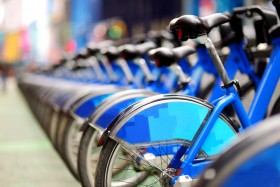MoGo & Other Dockless Bike-Share Program Liability

People have more options than ever before to get around town. People are no longer limited to driving themselves around, taking public transportation or a taxi, or walking to get around. Riding a bike has always been another great way to get around, but now you don’t even necessarily need to have a bike of your own to get around. In addition to electric scooter rentals, bike sharing programs like MoGo are becoming a very common sight around many major cities, giving people a convenient way to get around for short-term trips.
In late 2018, MoGo reported that over 237,000 rides had been taken on their bikes since the service launched in the city of Detroit in May 2017 and the service is set to expand into other cities in the Detroit area. But since there are some questions about legal liability and rentable electric scooters, are there similar problems around bike sharing programs?
Riding a bike, whether it’s a rented bike or a bike you own, always comes with some inherent risks. Since bikes are so much smaller than cars and other types of motor vehicles, cyclists face a high risk of being hit because many drivers often simply fail to see cyclists. In a case like this, liability would likely fall on a negligent driver. But the good news is that, statistically speaking, cyclists using bikes rented from bike sharing programs actually have a lower rate of fatalities compared to other cyclists. This can be attributed to several different factors, ranging from the design of bikes available through bike sharing services to the environments they’re most commonly used in.
However, whether you’re renting an electric scooter or using a bike sharing program, the owners of the bike sharing company has a responsibility to make sure their service is as safe as possible for the people who use them. This includes doing things like regularly maintaining bikes and providing users with information to users about how to use the bikes safely. If they fail to do either of these things, there’s a chance that they may be held legally liable for any injuries resulting from that.
But what about helmets? Helmets go a long way in helping to keep cyclists safe, but many people don’t carry a helmet around with them and many bike sharing services don’t have them available to rent. Would bike sharing services be liable if a rider was injured because they weren’t wearing a helmet? While wearing a bicycle helmet is always recommended, not all cities require cyclists to wear helmets, so most bike sharing services typically recommend that users supply their own helmets and they aren’t required to offer them to rent. Making helmets available to rent would also leave the bike sharing company open to more liability issues, so bike sharing companies are reluctant to make them available if they don’t have to. This is why you’ll be more likely to find bike helmets available to rent with bikes in cities where there is a mandatory helmet law for bicyclists.
When a person rents a bike through a bike sharing program, they typically have to agree to their terms of use, in which the company limits their liability and say that users say they agree to follow all applicable laws. But even with those terms of service agreements, you may still be able to make a claim for damages depending on the nature of your accident. Contact a personal injury lawyer as soon as possible to learn more about your legal options. At Goodwin & Scieszka, you’ll be able to speak to lawyers who are experienced in working with the victims of bicycle accidents in the state of Michigan. Contact us today to get started.






